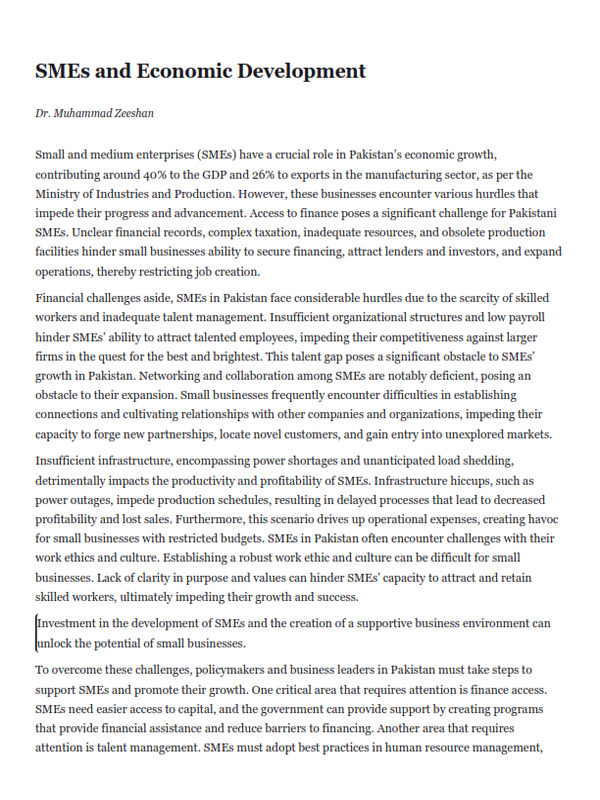SMEs and Economic Development
Small and medium enterprises (SMEs) have a crucial role in Pakistan’s economic growth, contributing around 40% to the GDP and 26% to exports in the manufacturing sector, as per the Ministry of Industries and Production. However, these businesses encounter various hurdles that impede their progress and advancement. Access to finance poses a significant challenge for Pakistani SMEs. Unclear financial records, complex taxation, inadequate resources, and obsolete production facilities hinder small businesses ability to secure financing, attract lenders and investors, and expand operations, thereby restricting job creation.
Financial challenges aside, SMEs in Pakistan face considerable hurdles due to the scarcity of skilled workers and inadequate talent management. Insufficient organizational structures and low payroll hinder SMEs’ ability to attract talented employees, impeding their competitiveness against larger firms in the quest for the best and brightest. This talent gap poses a significant obstacle to SMEs’ growth in Pakistan. Networking and collaboration among SMEs are notably deficient, posing an obstacle to their expansion. Small businesses frequently encounter difficulties in establishing connections and cultivating relationships with other companies and organizations, impeding their capacity to forge new partnerships, locate novel customers, and gain entry into unexplored markets.
Insufficient infrastructure, encompassing power shortages and unanticipated load shedding, detrimentally impacts the productivity and profitability of SMEs. Infrastructure hiccups, such as power outages, impede production schedules, resulting in delayed processes that lead to decreased profitability and lost sales. Furthermore, this scenario drives up operational expenses, creating havoc for small businesses with restricted budgets. SMEs in Pakistan often encounter challenges with their work ethics and culture. Establishing a robust work ethic and culture can be difficult for small businesses. Lack of clarity in purpose and values can hinder SMEs’ capacity to attract and retain skilled workers, ultimately impeding their growth and success.
Investment in the development of SMEs and the creation of a supportive business environment can unlock the potential of small businesses.
To overcome these challenges, policymakers and business leaders in Pakistan must take steps to support SMEs and promote their growth. One critical area that requires attention is finance access. SMEs need easier access to capital, and the government can provide support by creating programs that provide financial assistance and reduce barriers to financing. Another area that requires attention is talent management. SMEs must adopt best practices in human resource management, such as offering competitive salaries and benefits, creating clear career paths, and providing opportunities for professional development. These measures can help attract and retain talented employees, driving growth and competitiveness.
Moreover, fostering networking and collaboration between SMEs is crucial. These enterprises can gain advantages by partnering, sharing resources, and working together on projects. To promote this, leaders in government and industry should establish platforms that facilitate networking and collaboration among SMEs. Enhancing infrastructure, specifically in power and transportation, has the potential to amplify both the productivity and profitability of SMEs. Power generation and transmission infrastructure investments, coupled with advancements in road and transportation systems, possess the ability to decrease SMEs’ operating expenses, ultimately increasing their competitiveness.
Facilitating the growth of entrepreneurship and innovation entails equipping budding entrepreneurs with education and training. Business incubators and accelerators serve as vital platforms to provide mentorship, resources, and networking opportunities to nurture new businesses towards success. Moreover, policymakers can foster a conducive environment for investment in innovative startups by offering tax incentives and other support programs. Streamlining regulations and administrative procedures can facilitate the establishment of SMEs in Pakistan by reducing lengthy and challenging processes that entail bureaucratic red tape. This approach to supporting entrepreneurship involves minimizing regulatory barriers and simplifying administrative procedures, which can enable new businesses to start faster and with less difficulty.
Policymakers and business leaders should prioritize creating a legal framework that shields small businesses, promotes equitable competition, and curbs corruption to develop a favourable business environment for SMEs. This environment will aid SMEs in surmounting obstacles and flourishing in a competitive market.
Concluding, SMEs have a pivotal part in driving Pakistan’s economy, necessitating the leaders in business and government to facilitate their progress and expansion. To encourage the growth of SMEs, it is imperative to enhance accessibility to finance, talent management, networking, infrastructure, and work ethics. Furthermore, supporting entrepreneurship and innovation, and establishing a conducive business atmosphere can assist SMEs in surmounting hurdles and flourishing in a competitive market.
Promoting SME growth and driving economic development presents a significant opportunity for Pakistan. Investment in the development of SMEs and the creation of a supportive business environment can unlock the potential of small businesses, generating new jobs and propelling economic growth. However, realizing these objectives demands a joint effort from the government, industry, and civil society. Through the implementation of appropriate policies and support programs, SMEs have the potential to become a driving force for economic development in Pakistan.
The writer is a research fellow at the Pakistan Institute of Development Economics (PIDE).




